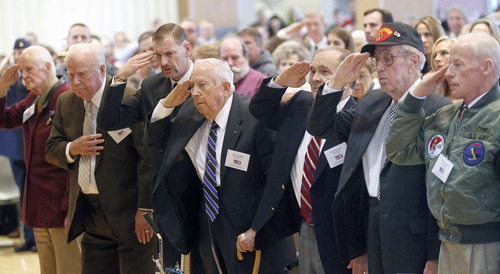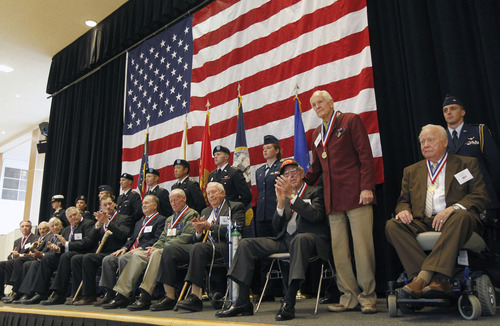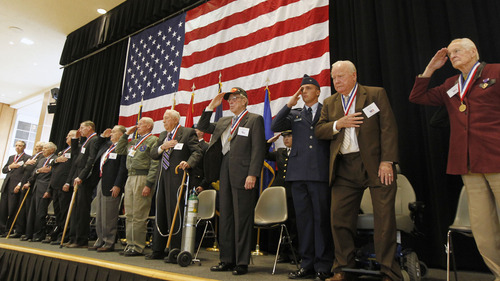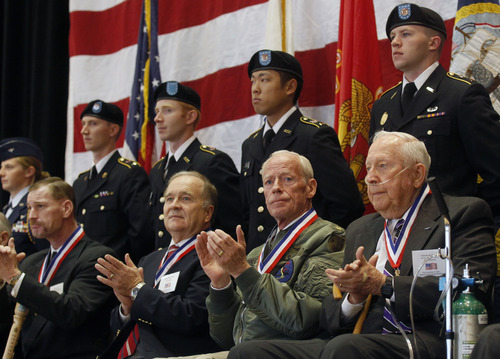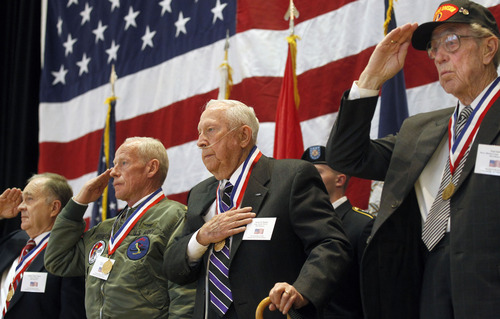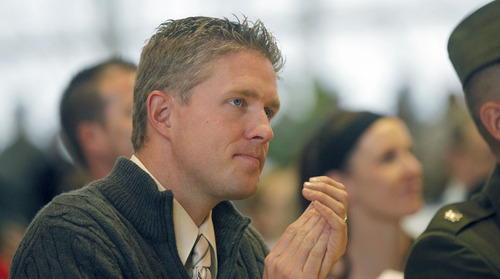This is an archived article that was published on sltrib.com in 2012, and information in the article may be outdated. It is provided only for personal research purposes and may not be reprinted.
Eleven veterans from four wars — gunners to medics — were honored in a dignified ceremony at the University of Utah Friday, but perhaps the most moving moment was when 45-year-old Gordon Ewell walked to the dais.
The lone veteran honored for service in this century's two wars, Ewell, of Eagle Mountain, walked haltingly with a wooden cane in one hand and a red and white cane for the blind in the other.
Ewell, a Utah National Guardsman originally from Emery County, served one tour in Iraq, from December 2005 to November 2006, but accomplished and risked more than most do in a lifetime.
A combat engineer and demolition specialist, he went on 59 missions with various teams, training them to clear routes of roadside bombs and eventually writing a training manual for use by soldiers throughout the Army.
Many of the missions were at night and included exchanging fire with the enemy. His teams usually found 15 to 18 improvised explosive devices (IEDs) to explode, and sometimes the bombs found them.
Seven times, he was injured in explosions, including once when several teeth were knocked through his cheek.
"The last one was one more than my body could take," Ewell said Friday, after exchanging greetings with a long line of well-wishers after the ceremony.
He suffered a traumatic brain injury, lost hearing in his left ear and nearly all of his vision. He had broken vertebrae and has been diagnosed with post-traumatic stress syndrome.
But he would do it all over, saying there isn't an "inch" of American soil that is not worth his sacrifice. "Even knowing every injury that's happened to me, I wouldn't think once [about not going.]"
Another Utah National Guardsman was honored formally Thursday night as the University of Utah's student veteran of the year. Brent Taylor, of North Ogden, is finishing his master's degree this semester and has begun work on a doctorate in international studies. He joined the Guard in 2003 and served two tours in Iraq and one in Afghanistan.
Friday's 14th annual ceremony was made solemn by a lone bagpiper playing "Amazing Grace," a bugler playing taps and a 21-cannon salute outside on the snowy lawn adjacent to the U.'s Union Building. Each of the 11 veterans received an honorary medallion.
The last veteran to take the dais, Clyde E. Weeks Jr., was thrilled to give another World War II honoree, Paul Smith, a pat on the back, saying, "He saved my life!"
Weeks was a Marine telephone lineman during the invasion of Guam and was struck by a Japanese grenade that sent 22 pieces of shrapnel into his body.
"He came with a stretcher and a buddy," he said, gesturing to Smith.
Smith, a Marine medic, said it's unlikely he was the one to save Weeks, although "It was kind of him to say that." Smith was 20 miles away, on another part of the island, caring for hundreds of injured U.S. servicemen, he said.
The eight other men honored Friday were:
Gilchrist "Gil" Booth (Army, World War II), Richard Lee Burns (Air Force, World War II and Korea), Charles R. Hughes (Army, World War II), Joseph Stobbe (Army, World War II), James Hoyt Andrews (Marine Corps, Korea), Richard S. Dixon (Army, Vietnam), Kimel "Kim" Fisher (Army, Vietnam), and Edwin B. HerrNeckar (Army, Vietnam).
For more on veterans and Veterans Day
To read profiles of the honored veterans, read Eleven Utah veterans, from WWII to Iraq, to be honored Friday
For a list of events related to Veterans Day, read Utah to celebrate Veterans Day with parades, tributes


